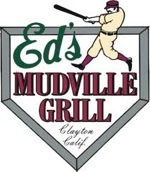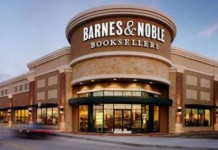 Probably the biggest news of the past week in eBookville (and pBookville, or just plain ol’ Bookville to cover the universe of books and readers) is that Barnes & Noble may be put up for sale. The speculation in the blogosphere is that B&N is on a deathwatch. There is no joy in Bookville today!
Probably the biggest news of the past week in eBookville (and pBookville, or just plain ol’ Bookville to cover the universe of books and readers) is that Barnes & Noble may be put up for sale. The speculation in the blogosphere is that B&N is on a deathwatch. There is no joy in Bookville today!
From a financial perspective, B&N is pretty solid; the primary impetus for the possible sale is that some investors think B&N stock is too undervalued, that is, the company would be worth more to them if it were sold than if it were to continue to make money at a steady level. (Yes, I’m aware that they lost money, attributable to nook development, in the last quarter, but I prefer to look long-term and not focus on a quarter or two.)
This raises a lot of issues, not least of which is the focus of investors on making a quick buck. I’ve always considered the complaints about IBM stock as an example of misdirected investor greed. Consider that IBM is pretty consistently profitable, owns tons of valuable real estate and patents, and returns a regular dividend. Then compare that to, for example, Amazon. No more need be said on that score.
But the real threat if B&N goes under is to consumers of books. One blogger, Mike Cane, has suggested that Amazon should buy B&N and gives 15 reasons why (see Barnes & Noble Is For Sale: Amazon Should Buy It). Some of the reasons on the surface appear attractive for a company like Amazon and for consumers, but giving careful thought to the proposition might lead to a different conclusion for consumers. Of course, whether the Department of Justice would approve of such a purchase is uncertain and I think unlikely for lots of reasons, but those are not the subject of this article. Once again, Mike Cane and I disagree. (We also disagree about whether Amazon has won the ebook war; he says yes and I think the outcome is yet to be written. I agree that Amazon is winning, but until the finish line is crossed, anything can happen. More than one megalomaniac has fallen before crossing the finish line.)
Let’s assume that Amazon currently controls 30% of the retail book market in the United States, which is a figure that has been bandied about in recent times. B&N is credited with a 20% share of that market. Between the two competitors, 50% of the U.S. book market — print and electronic — is controlled. That makes these two competitors an important outlet for authors, publishers, and consumers. For consumers, the value is in the competition between the two, which helps keep prices low. Add in Wal-Mart and Target, both of which are growing booksellers, and other similar box stores, and you have a pretty competitive playing field. (Remember the holiday price war between Wal-Mart, Target, Amazon, and B&N?)
Consumers who are focused solely on price need to look beyond today’s pricing and wonder about tomorrow’s pricing should Amazon own 50% of the book market. There are several reasons for concern. First, is Amazon’s attempt at vertical integration of the market by offering both publishing and retailing services on a grand scale. If an author is given a choice between publishing with an entity that controls 50% of the retail market or with a traditional publisher who controls 0%, with whom is the author likely to sign? Down the road will such integration really benefit the author or will it put Amazon in a position of dictating terms? I haven’t forgotten the problems of just 18 months ago when trying to negotiate contract terms with Amazon to sell books on the Kindle.
Second, we must consider to whom Amazon owes its loyalty. By law, if nothing else, Amazon owes its primary duty to its shareholders, shareholders who want maximum return on their investment (which is the problem B&N is facing with investors believing it is undervalued). I wonder whio is the largest individual shareholder of Amazon? I know it isn’t the consumer me. How do you get maximum return? By maximizing profits, which is often done by increasing the spread between costs and sales price. If Amazon owns 50% of the market and has no significant individual competition, it is in a position to set prices at whatever level it believes maximizes its return on investment. Even the Agency 5 would have to cave to Amazon’s pricing demands — 50% market share is a whole lot of market share. Isn’t this what Steve Jobs does at Apple? Once you get past Apple’s hype, is a Mac really worth that much more than a Windows PC? Why would anyone believe that what Jeff Bezos says today about being the consumers’ friend will still be true when he is in a position to dictate terms without competitive concern?
Third, is the question of open format. Mike Cane believes that Amazon’s buying of B&N would give Amazon the opportunity to drive the final nail through the heart of ePub, and he may well be right. But how does that benefit consumers? Has anyone noticed that Amazon refuses to let anyone else build a Kindle clone or include on their ebook-reading device the Kindle formats? Does this look like (smell like?) Apple yet again? Imagine if the market dominance of Microsoft and Apple were reversed. I wonder how much more people would be paying for a Mac than the premium they are already paying. I fail to see how Amazon’s replication of Apple’s closed system in ebooks would be good for the consumer; I can see how it would be good for Amazon, just not for me. If B&N goes under and the ePub format suffers a major blow, with Amazon’s unwillingness to open its proprietary formats, we would see the decline of other device manufacturers and ebook sellers — neither a pretty nor a desirable picture.
B&N or an outfit like B&N needs to survive to provide Amazon with competition. It is the competition between these two giants that best serves the reading consumer. Perhaps to survive B&N needs new management — I certainly wouldn’t give Leonard Riggio any kudos for how he has brought B&N into the 21st century, whereas I would give Bezos a lot of credit for what he has done for Amazon — but a management change is a lot different from a funeral march. If B&N is to be sold, then I have to hope for a particular buyer, which I hope is Wal-Mart because it could give Amazon a run for its money and even beat Amazon at its own game. Now that would make for an interesting competition!


































Wal-Mart?! Seriously??!
Ouch, man.
Who else besides Wal-Mart has the financial wherewithal to stand up to the Amazon juggernaut? Wal-Mart could easily compete for the James Pattersons and Stephen Kings of the authoring world and no matter how low a price Amazon puts on a book, Wal-Mart can meet or beat it and it wouldn’t even register on the Wal-Mart financials.
I’m sure Warren Buffet and Google could also stand tall in such a battle but I don’t think the mix is as good. Wal-Mart has the retail know-how and size to immediately compete with Amazon; neither Google nor Buffet are similarly situated (and Bill Gates is too busy giving away his money). Steve Jobs and Apple would simply kill B&N, so the only possibility I see is Wal-Mart or maybe Target.
I think it’s more likely Len Riggio just wants to take B&N private so that he can focus on the long term instead of having to deal with Ron Burkle.
Great article although I think it’s a little misleading to say Amazon won’t let any other ebook readers “include on their ebook-reading device the Kindle formats”. Of course the Kindle app is available for iPad, and more importantly now for Android. An ebook reader that wanted access to Kindle titles could adopt the Android OS, which is largely open-format.
I’m with Bruce.
Other than Riggio and Burkle, who would want to buy B&N? Bookstores are in secular decline. B&N is trying to move forward and reduce its reliance on selling books in its stores, but that takes capital expenditures which are hard on the bottom line, which is in turn hard on dividends and stock price.
Anyone who buys B&N needs to either be prepared to spend the money it’ll take to keep B&N viable regardless of the quarterly and annual results (Riggio), or else sell off as much as possible and then milk that cash cow until it falls over dead (Burkle).
There’s only one reason Amazon would want to buy B&N: to wipe it off of the competitive map. I don’t see that happening.
Don’t worry Rich, the nook isn’t going anywhere. Barnes and Noble is just going to be a private company.
I am a B&N investor (for now, obviously) and have been following this closely. The (former) CEO Len Riggio owns 30% of the stock and is just looking to buy up the rest. He is anticipating losing a trial that would remove his “poison pill” protection and is worried that the shareholders will vote “no confidence” in him in September. Announcing a “public sale” is simply something that he has to do for legal reasons due to his position on the board. The board members tasked with supervising the sale recently testified on Riggio’s behalf in the Riggio-Burkle trial, so I don’t think they are actively seeking out other opportunities. Ron Burkle, who owns just under 20% (the maximum he’s allowed to) and is allied with an investment group that owns another 10-20%, may make a counter-bid. I doubt that bids from other companies will be sought out or even considered.
Both Burkle and Riggio have supported the development of the nook and will probably focus on closing/ reorganizing physical stores to focus more on the digital side of the business. It will be difficult to do this without upsetting shareholders and getting voted off of the company board. It’s not so much that the investor’s don’t like short-term losses as it that this strategy changes the entire risk profile of the company. I can certainly understand why someone who intended to invest in a boring 100+ year old bookstore paying a solid 4% dividend would be upset to find it rapidly becoming a growth-oriented high-technology developer.
If outside bids are considered, however, kudos to you for being the first to identify Google (in your comment). I’ve been seeing a lot of people suggest that Apple might be interested to expand ibooks. But when has Steve Jobs EVER bought out anything? He likes to build from the ground up. As you point out, Amazon may face legal issues if they try a merger. That leaves Sony and Google as the only other players in the E-book market with deep enough pockets to buy up B&N and capitalize the digital side. Either of those two companies could easily run circles around Amazon based on technical merits, but would need B&N for the bookstore catalog and knowledge and connections within the publishing industry.
Even though I don’t think it will happen, it is fun to imagine what would happen if Google Editions finally launched using Nook as a platform base.
Sorry for the long comment.